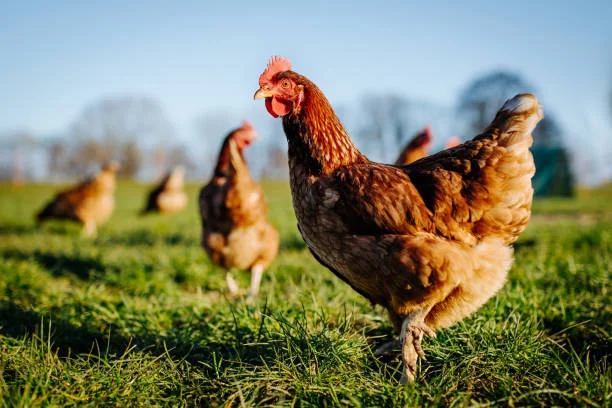Best Free Range Egg poultry farming------------------
Free-range egg poultry farming is a husbandry technique that involves raising poultry, such as chickens, in a manner that allows them to freely roam outdoors for a portion of the day. Unlike traditional poultry farming methods that confine birds to limited spaces, free-range systems provide ample space and outdoor access, enabling the birds to partake in natural activities like foraging, dust bathing, and scratching.
This method emphasizes the importance of allowing birds to have access to the outdoors, enabling them to engage in instinctual behaviors. In contrast to conventional confinement systems, free-range operations prioritize the freedom for birds to explore outdoor areas and express their natural behaviors.

The Benefits of free range Chicken------------------
- ✓ Birds in free-range systems access outdoor areas.
✓ Varying outdoor time promotes natural behaviors.
✓ Emphasis on ethical and sustainable farming practices.
✓ Consumers seek products labeled as free-range.
✓ Interest in additional information about outdoor access conditions.
✓ Grass fields and pasture mimic natural environments.
✓ Opportunities for exploration enhance bird well-being.
✓ Labeling reflects commitment to animal welfare.
Importance of Free range poultry farm------------------
It is crucial to acknowledge that the term “free range“ can be interpreted differently and regulated in various ways across different regions. Certain certification standards outline specific requirements such as the minimum outdoor space per bird, the duration of outdoor access, and other criteria that must be met in order to be considered free-range.
Consumers who are passionate about promoting ethical and sustainable farming practices often opt for products labeled as free-range or seek out certifications that guarantee the fulfillment of certain welfare standards.

Proponents of free range farming ------------------
- ✓ Advocates emphasize free-range farming for bird health.
✓ Outdoor access reduces stress and improves immune function.
✓ Overall well-being of birds is enhanced.
✓ Roaming outdoors allows natural activities like foraging and scratching.
✓ Dust bathing contributes to a decrease in stress levels.
✓ Free-range system mimics natural settings.
✓ Health advantages include improved bird well-being.
✓ Stress reduction through natural behaviors is crucial.
Enhanced Nutrition more varied and natural diet------------------
The term “enhanced nutrition“ generally pertains to food items that have been fortified or enriched with extra nutrients in order to boost their nutritional content. This practice is carried out for a variety of purposes, which may include addressing specific nutritional deficiencies, promoting overall well-being, or catering to the dietary requirements of particular groups of people.
Certain products are specifically designed to meet the nutritional needs of specific populations, such as children, pregnant women, or older adults. These specially formulated products may contain adjusted levels of certain nutrients to support the health and growth of these particular groups.